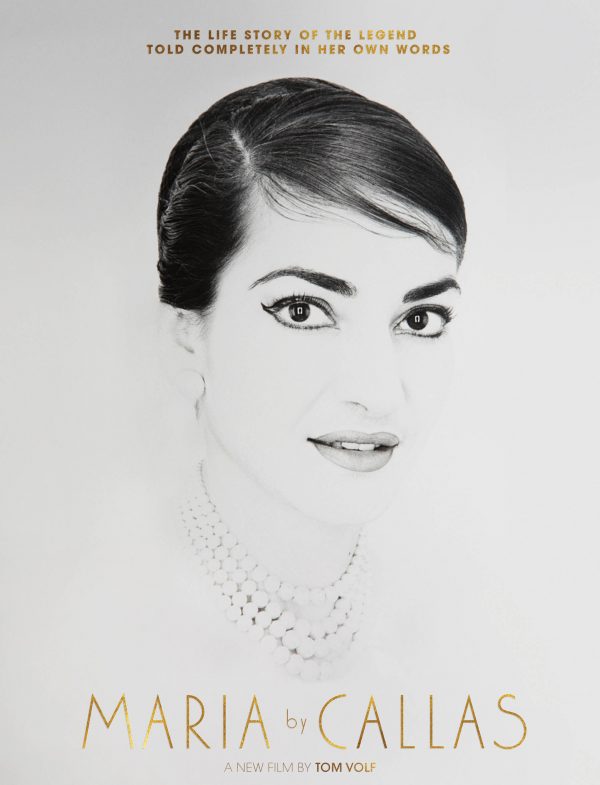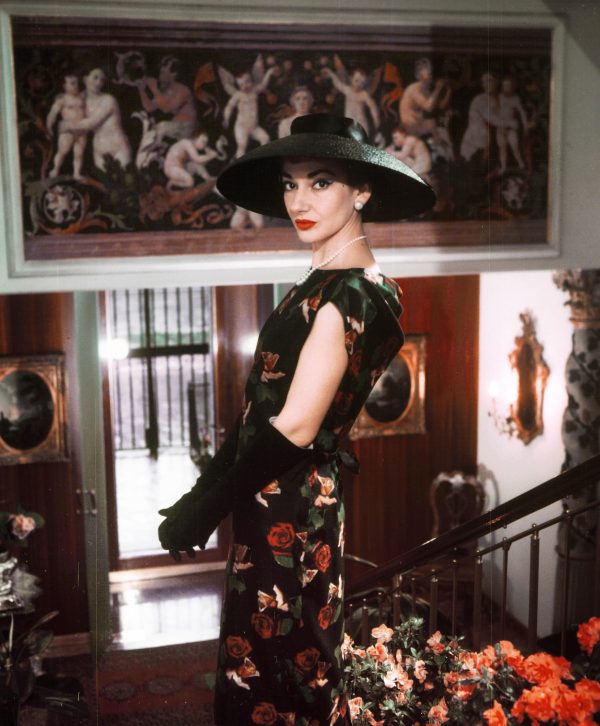It was an amazing discovery for me to watch Maria Callas, the most iconic opera soprano of all time (that I had only previously seen in photographs and listened to in audio recordings) smiling, speaking and singing in never before seen video footage assembled by young filmmaker Tom Volf for the documentary Maria by Callas. It was a revelation to realize how funny and charming this elegant diva actually was, in the 1970 TV interview by David Frost that serves as through line, to follow her facial expressions and well-enunciated words, while she sings four complete opera arias with the unique and revolutionary style of a true artist.
 As a teenager growing up in Italy in the 1960s, I was aware of Callas, who was often pictured in magazines, but I never saw her sing live or on TV. I attended every performance of the season at our historical 19th century theater — plays, classical concerts, operas. Alas, Callas never performed in my hometown of Modena, and by 1965 she had retired. Her final opera performance, in Tosca by Giacomo Puccini, with Tito Gobbi as tenor and Franco Zeffirelli as director, was on July 5, 1965 at London’s Royal Opera House, Covent Garden.
As a teenager growing up in Italy in the 1960s, I was aware of Callas, who was often pictured in magazines, but I never saw her sing live or on TV. I attended every performance of the season at our historical 19th century theater — plays, classical concerts, operas. Alas, Callas never performed in my hometown of Modena, and by 1965 she had retired. Her final opera performance, in Tosca by Giacomo Puccini, with Tito Gobbi as tenor and Franco Zeffirelli as director, was on July 5, 1965 at London’s Royal Opera House, Covent Garden.
In the late 70s, I had the good fortune of meeting tenor Luciano Pavarotti, who was born and lived in Modena, and soprano Renata Scotto, when they performed in Los Angeles, where I had moved to live in 1973, thanks to my friend Peter Funsten who took me backstage to introduce me to my compatriots. I grew up in Italy surrounded by opera, an essential component of Italian culture, and I taught myself classical music from books and vinyl records, since music was strangely not taught in our classical high school, where we studied History of Art, Philosophy, Italian Literature, Roman, Medieval and Modern history, Latin and ancient Greek Language and Literature. But it was not until 1977, the year Callas died, when I started seriously studying opera, under the guidance of my friend Don Franzen. One of the first vinyls I bought was La Divina Maria Callas in her greatest recordings 1953-1964, issued by Capital Records in 1977.

Born in New York on December 2, 1923 of Greek immigrant parents, Maria Callas moved to Greece with her mother in 1937, studied bel canto singing with Spanish coloratura soprano Elvira de Hidalgo. In 1941, she made her professional debut in Athens. In 1947, she started her opera career in Italy with La Gioconda by Amilcare Ponchielli in Verona. The conductor was Tullio Serafin, who became her mentor. That’s when Maria, 23, met wealthy industrialist Giovanni Battista Meneghini, 51, and married him in 1949. In 1959, she started a passionate affair with Greek shipping tycoon Aristotele Onassis, 53, who would end up marrying the glamorous widow Jacqueline Kennedy in 1968, but still continued to be close with Callas until he died in 1975.

Famous Italian movie directors found Callas fascinating. Luchino Visconti directed her in 5 operas from 1954 to 1957, memorably in La Sonnanbula by Vincenzo Bellini at La Scala in Milano in 1955, with orchestra conductor Leonard Bernstein.
Franco Zeffirelli, who had directed Maria Callas on stage in La Traviata by Giuseppe Verdi, Tosca by Giacomo Puccini, and Norma by Vincenzo Bellini (1964), directed a biopic, Callas Forever (2002), with French actress Fanny Ardant playing Callas.
Pier Paolo Pasolini convinced Callas to star in his movie Medea (1969), from the Greek tragedy by Euripides. For the similarities between Medea and Norma, a signature Callas role, you may read my article in Cultural Weekly.

In 1971-1972, Callas taught a class about operatic singing at the Juillard School of Music in New York. In 1997, when I interviewed Faye Dunaway in her Beverly Hills home for a cover story in VENICE magazine, about playing Callas in the play Master Class by Terrence McNally, she said, “This play is about an uncompromising artist and a professional who will stop at nothing to serve the art that she loves.” You may read the complete interview at this link.
In 1973-1974, tenor Giuseppe di Stefano, who had often sung with Callas in the 1950s both on stage and in recordings, talked her into a concert tour where they sang opera duets together. Then Callas retired again and died in Paris on September 16, 1977 at age 53.
Maria by Callas was presented at the Toronto and New York Film festivals, and opens in Los Angeles at the Royal on Friday November 2. It is an experience that no opera fan should miss.
